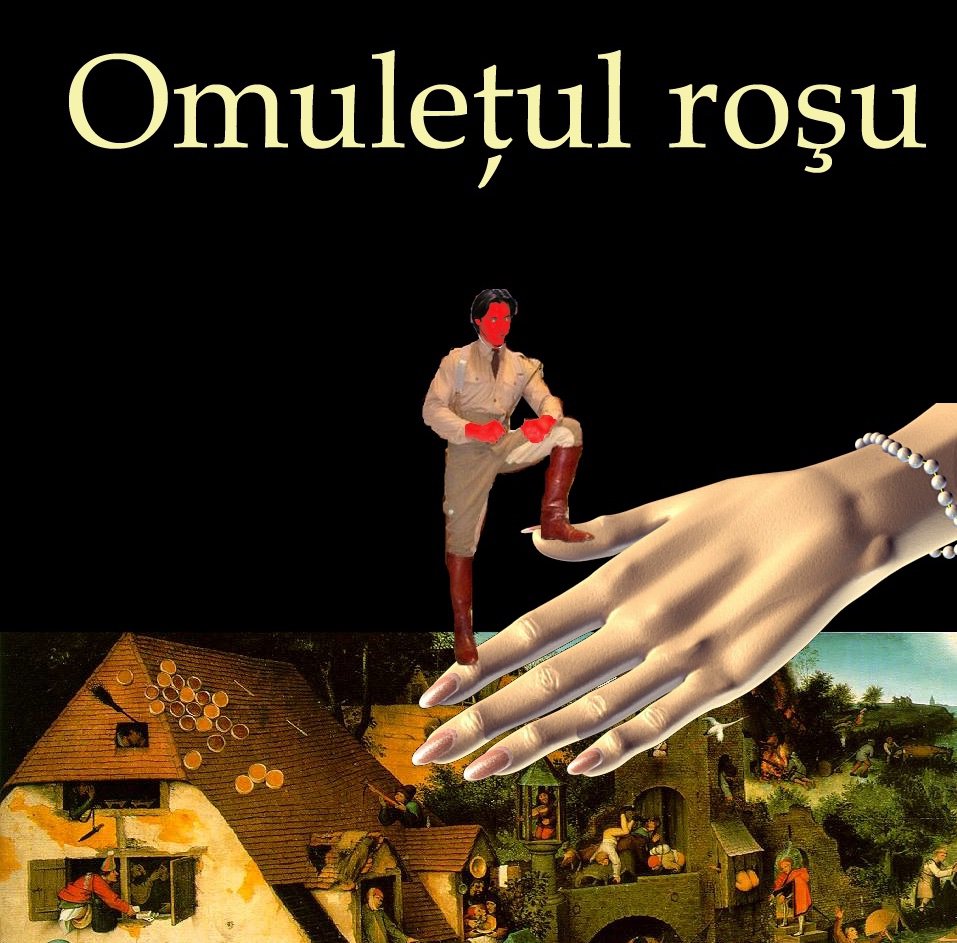
We are in the late 90's. An IT specialist conducts an experiment which results in the accidental emergence of a cyber entity. He materializes after coming into contact with Laura Iosa, but he knows that he can't stay in this form for too long.
“After I got used to the darkness, I realized I had lost you. I started distinguishing the silhouettes that occupied the room, firstly as marbles, lined up on an abacus, many, tiny – waves of little red men, side by side, waiting, an army of clones, your brothers, frozen in place, maybe forgotten in an abandoned warehouse.
I took a couple of steps, and then I noticed how they moved aside, lined up like before a king, and at the end of this endless tunnel the screen that read alazar was flashing furiously.”
A young witch by the name of Cat o’ Friday, who isn’t initially aware of her own powers. All she knows is that she has crooked teeth and that if she shows them to someone, that person loses their mind, they stutter. If a wizard kills her, the murderer doubles their magical powers. That is why she never reveals her name. Zăval and Maxima Tutellina are the only ones who know it. She wrote The Book of Perilous Dishes.
“In the porch there was a painting of Hell, and in the middle of it a pot of pitch was bubbling on the fire, with a the head of a woman, wracked with pain, emerging from it: an old woman with bulging eyes and drooping, dog-like ears. Beside her there was Cyrillic writing, so orderly that even I could understand the words: Cat o’ Friday.
No glory was left to me, no dream. Only the legend of an evil hag.
For Cat o’ Friday, the hunted witch, was me.”
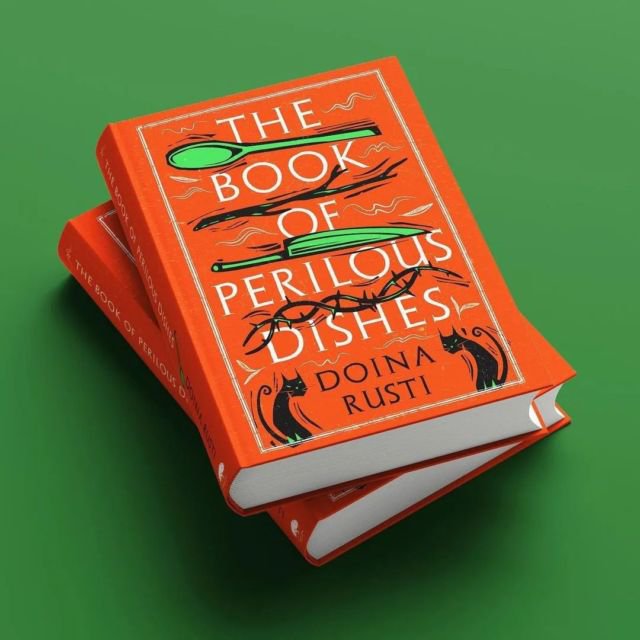
He is a Satorine wizard. He can transport things and people over long distances, and he is able to decompose himself into tiny particles and then recompose around an element (one of his own molecules), placed specifically in a different region of the world. He can also communicate telepathically with his twin sister Maxima Tutellina, also a witch. He knows many recipes and elixirs…
“Someone was lying on the floor. At first sight, it seemed to be Cuviosu Zăval. I didn’t dare to approach him or even to move. But soon I had no doubt. I saw his little heart. It was his custom first thing every morning to draw a little black heart on his cheek, to bring him luck. Summer or winter, in sadness or in joy, Zăval would redo the outline of the heart, a tiny patch, so that, seen from a distance, it just seemed to be a little beauty spot, which heightened his charm. It was impossible to imagine my little uncle Zăval without that ornament! The tiny heart was tattooed, but every morning he refreshed it with a layer of carbon and with oils, which made it look as if he had been born with it. So it was him, there was not the slightest doubt, dead, with a knife thrust under his chin. Around him a pool of blood glistened.”
Satorine witch, Zăval’s sister (name inspired by a lesser-known agrarian deity of Latin heritage – Tutellina). Maxima knows many secrets and brings up Cat o’ Friday, initiating her into the order of the satorines.
“Maxima read dreams, she made elixirs and ointments, and she could always cure me of a headache with two words that, even though I still remember them today, are no longer of any use to me. On summer evenings she would write on the door of the house Laco Fulvus, and whoever tried to enter—because uninvited salesmen sometimes came, or the odd neighbour with nothing better to do—was scared to death by the ghost of a monstrous dog.”
Second-rate magician and charlatan, spiritist (who actually lived in Bucharest at the end of the 18th century).
“As he spoke, with a voice that left an ache in your heart, Perticari would fix his eyes on each of the company in turn, and the servants, listening through a crack in the door or at the window, would repeat what he said word for word, till it was the talk of the town. Consequently, I too knew what the Serb looked like.”
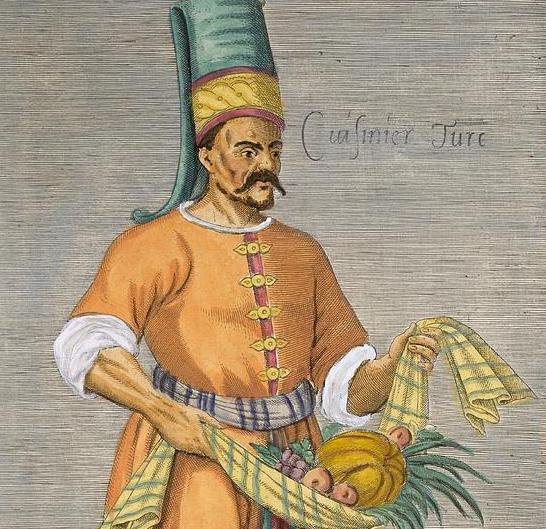
Cook, master of magical elixirs, disciple of Cuviosu Zăval.
“My words will never be seen by anyone, for they are not for eyes. They are just in my mind and in Sator’s, and perhaps for the ears of a Pole who will live for two hundred years. One day he will write on paper all that wanders through my mind, and his book will pass from hand to hand for centuries. Many will call it the Story of the Cook, but even more will read it as a fairy tale. And all this will happen only if I am not impelled by the great Sator to pour it into another ear.
My story begins with a leek broth that I had made just for myself. What evenings there were back then! Especially that evening, when the earth was still thronged with the memory of the snow, and into our lady’s palace came the great Mihalache Albu, a man so grand, the like of whom had never been seen in the Greceanu neighbourhood or heard of by anyone in all Bucharest, grand as Bucharest might be and the very navel of the earth. They said his dad had sold Gypsies like me, hundreds or maybe hundreds of hundreds of Lingurari, of Rudari, and whatever other poor wretches were for sale, and so accumulated piles of money, whence the wealth of Mihalache, who bought for himself palaces, carriages, and the rank of vornic. And this extraordinary man, who went about carriages the like of which no one had ever seen, met his death in his wedding bed, on that evening on which I had made a beautiful leek broth, and the last mists of winter were rising from the earth below the kitchen windows.”
Magical trees, from beyond the world, from the groves of death.
"To be alone among the trees – that was something that had never crossed his mind.
His life before the carobs was like an immaculate page, violently torn from a new notebook. As far as the eye could see, the forest lay vast, and what was really amazing was the fact that all the trees were leaning in the same direction, like they did in cartoons, elastic, harmonious even. It was wonderful! White shadows were following behind, and with them, under the spell of verdant music, he felt happier than he ever had before. Is this perhaps the Afterlife, he wondered, or have I just fainted and I’m in intensive care? A murmur descended from the tops of the trees, which were distinctly tall, now that he thought about it, lined up like organ pipes. Several voices seemed to coalesce into a single one. At first, he thought he was hallucinating, but then he heard, as clear as a bell:
“This is your world, and the other world is where you came from!”
“And now?” Căpriceanu asked in his childhood voice. “What's next?”
“Now we move on”, the trees answered in unison.
His feet pattered on the marble road. The huge crowd, millions of dead people like him, bundled out. How could they walk out blindly, without knowing exactly what awaited them?
He stepped out of the queue and took a few steps through the woods.
“And God?” Căpriceanu asked. “Where is God?”
The branches swooshed somewhat ironically, then said softly:
“Dear, it’s just us here, as you can see!”
“But who are you?” he raised his voice, taking advantage of the trees’ kindness. “What's your name?”
A faint guffawing was lost among the branches, then the voices answered:
“We are wild carobs.”
Mystical, created in the world of the dead.
“The carobs were purring smoothly, he could see their shadows scattered throughout the room, and, looking around, he finally found the bed. And what a bed! An unbelievable piece of furniture, a king of beds, white, with its headboard mounted on a wall like a flowering lilac, a headboard sculpted with arabesques and ruffled peacocks, with floating flowers and leaves that looked like they were falling from the heights of unseen trees, some preserving still their ancient colours, faded shades of green and coral. And under this daring lace, in the smooth space stretching to the blanket, a snowy field glimmered invitingly.
It was a bed forged for a first night of making love, Flori thought, an intuition that immediately melted into the restless leaves of the carobs, which wouldn’t stop shouting at her. She had just entered, she knew the pianist was telling her something, but at the same time he was walking down the alley. The eunuch was trembling slightly further away, holding a hand in his pocket. He was intimidated, and from above, from the tall crowns of the locust trees, came a hum, a disapproval. He looked her in the eye as if he had won, and then he gently pulled out the hand in which he was holding a ripe carob. It was embarrassing. Flori was smiling, and when the eunuch headed towards the door, dozens of foggy figures followed him. She could hear the leaves chirping amused, and at the same time, the pianist's voice was descending into her eardrums.”
Persistent mediocrity, which rushes the world into full pandemic.
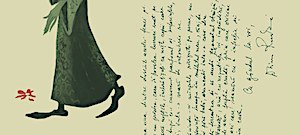
Huge creature, living in sloughs, hidden in the Cotroceni Forest. Năltărogul is a ghost haunting the city, a Saint Germain, guardian of history and, at the same time, the last of its kind.
“Along with dozens of brains, she too had started to think of the fabulous kitchen that Năltărogu had under Gorgan, a thick stove on which it cooked white sauce stews made of people! When she would open the windows to the square, she was often distracted by the smell of stew, a scent that, in the evening, when the crowns of the linden trees seemed motionless, floated over houses, slowly entered the gardens, slid over Dâmbovița, up to the bottom of sloughs and wave fortified shores, and, above Gorgani Square, she would watch how steaming hats sometimes gathered, the souls of those who were boiling in the man-eating ghost’s cauldrons. She even remembered seeing him in the pond, a floating head, she dreamt of his wide eyes that made you forget any thought you might have had about ogres and ghosts. Why hadn't he eaten her? Maybe he preferred certain people, he was picky and that was completely understandable, after all he had plenty of choices! It won’t do to use blackbirds and thrushes in your stew!”
Dwarf species – of the same name, same appearance; they don't know how to lie or cheat. They prepare elixirs.
"As the only events in his life were the encounters with the madmen lost in the woods, he placed the basket on the ground and waited, following the direction of the shouts that were slowly reaching him.
The frightened man was a naked, beaten-up wretch. At first, he looked at Lecu as everyone looked at him, as a sort of miracle, as a devil of the forest, but then, gaining courage instead of tensing up, as most did, he began to complain with a lisp:
“I got lost in the woods!” They beat me up, took my clothes, everything I had! They even took the rosaries! Do you understand me?! What kind of people steal rosaries?
Lecu listened to him quietly, as he usually did, so the lisping man, thinking the creature felt sorry for him, started going into more detail.”
The only animal that melts at the touch of Năltărog, behaving like a human being.
"It was a cuddly animal, like cats are, with the fur like a tiger’s. The cat had lived with him for three years, enough for Father Ambrozie to consider it the only being worthy of his feelings. Whom do you love? The one that’s a good match for me! And this cat was the best match for Ambrozie!
People in town only spoke about the cat, who, after inheriting its master, had changed colour. It was her, nobody doubted it, but its tiger-like fur had turned white, like an angel’s. Only a patch of its former fur was left on her head, a stain that bound her to the past."
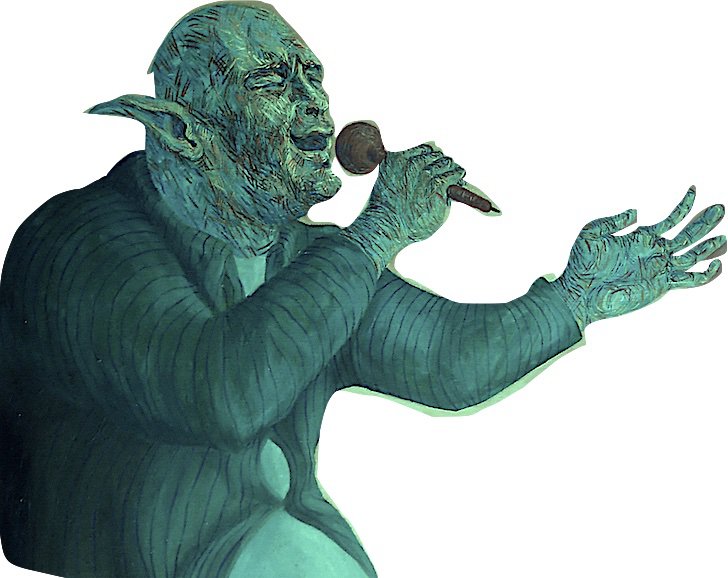
(After a painting by Victor Gingiu)
The ghost is a polymorphic entity, created from the emotions of a teacher. It takes on a different form for every man, depending on their desires or fears. For Adela he becomes a man she had once seen in the abandoned mill (Nini Jighereanu, alias Sandu Ion, alias Max), but in time, after all people take on the appearance of this character, we realize that for her, the ubiquitous ghost is the dictator of that world (Ceaușescu), whose portrait she sees daily, everywhere.
The ghost in the mill is the hidden world of emotions, of affectivity, preserved under lock and key, in a realm where no one tells the truth, where no one dares divulge their opinions, let alone their feelings.
“Someone was walking not too far behind. He had turned discreetly and froze on the cement stairs. Nearly glued to him, the ballet-dancer in the mill was smiling fondly. The porter watched him through the gauze curtain, but didn’t look too invested. Neicușoru took off, moving away from the institute as fast as he could. He could feel the light footsteps behind him, but he didn't dare look over his shoulder. From time to time, a wave of perfume drifted past his ear, diffused by an invisible sprayer. Reaching the school, he abruptly turned around. He was there, behind him, smiling, with his elastic body hugged by a translucent suit. A streak of sweat settled on his forehead, wiping away the newer layer of dust. How did you get out of the mill? he asked in a whisper, quickly looking around to make sure no one saw him. But the man smiled at him again, his face pale, his lips moving only slightly, like a melon’s core. Neicușoru was awed and so amazed by the occurrence that he threw caution to the wind. After all, he was standing in the middle of the road, where he could meet anyone, even a silky ballet-dancer."
“Mircea Buțescu had been waiting in the old bell tower for more than an hour, leaning against the brass bell and staring at his ghost like a dark, defiant log. He felt there was a force beyond him, a sort of God, but not the one he had believed in as a child; no, a cynical, vengeful God. The thin wheel looked like a sunflower, brown, sprinkled with dozens of tiny, lipless mouths befouled by saliva. It followed him everywhere. Nothing drew him to the mill anymore, and he had escaped Paula's greedy mouth, but he could still see the black circle in front of him, and felt its smell of ancient stables. He wasn’t precisely unhappy, at least he was rid of the horrendous meetings, but he still felt gloomy, disappointed and betrayed.”
“The cold snake slipped between her lips, thin as a nylon thread, smooth and stiff, and when it reached the oesophagus, it rolled itself up like a hedgehog, exploding and flinging its needles into every fiber of her flesh. She no longer felt any pain, nothing bothered her anymore. She was a sort of oilcloth now, no emotions, no desires, no dreams.”
Eight sounds float over Bucharest and change many things: a teenager girl from today's Bucharest travels to the 18th century several times; a student at Lazăr Highschool is trapped in a time loop. Madi and Iulică, lost souls, end up roaming around Bucharest, and so on. And all these anomalies cease as soon as the eight sounds end their journey.
“The eight sounds drifted away, crammed into each other, tinted by the light that passed through them in all colours, hues and shades. They had flown across the boulevard, above the cars, and he watched them from the curb, afraid he might lose them. On the other side of the street, a girl was waving at him. She was about to work her way through the cars when he raised his hands in fright. Something distant and sad, an ancient fear, had crept up the back of his neck like a zipper. She stopped abruptly, confused by his gesture, smiling broadly under her bangs, and suddenly decided to change course, motioning him to come down to the bookstore.
For a while, Cristian looked for the sparkling sounds, but he realized that they had melted in the warm air. He tried following Madi, but suddenly his soul was overwhelmed by the joy of knowing himself to be free.
He wanted to smoke a cigarette while he sat on the curb, to roam the streets, and inhale the cruel smell of other people.”

(After a painting by Victor Gingiu)
Word-eating city
“The laughter in the Metropolitan church's yard spilled over into the streets, causing several alarmed heads to freeze. Leun's name floated over Dâmbovița, hit by the waters, its echo passing by gates and travelling below bridges, confusing the crowns of mulberry trees; near St. George's Church it disappeared completely, which was perfectly normal, as Bucharest, for those who live their lives completely unaware, is a word-eating city, a whisper-fed hole, a storehouse of whistles and songs. It's a blotter city. It doesn't matter where they come from, whether they are German, Greek or even representatives of a dead language. Every word is a spark, fuel that keeps the city alive. Whoever wants to rummage for lost words, whoever is gripped by the desire to find those sweet throwaways, must surely start with Bucharest. The words that escaped from all around the city, with or without permission, travel on its fibre like the items of a luxury shopfront. Sometimes, a refrain can be heard out of nowhere, inexplicably carried by the waters of Dâmbovița, so that on its quay you’d dare imagine sprites are whispering.”
“For a while, the ghost haunts Bucharest at the edge of Bozărie.
After a few days, Tranca's soul haunted Colțea, where the porter himself, a eunuch with a tattooed cheek, told how he had seen her among a group of hikers, which made him famous for a day. Although the man saw her again later, the story no longer interested anyone. The ghost was then seen at Lascăr's Bridge. It was still night out, a starry-skied, white night. Tranca, wearing galoshes, had danced on the bridge deck and disappeared like a balloon. Many Bucharestians dreamt of Tranca, and some cobblers from the back of Doicescu’s yard swore up and down that they had seen her jumping over the gate, and then they filed a complaint with the authorities about some bales of felt they claimed the phantom had taken under its arm.
For a few weeks, Tranca’s ghost haunted Bucharest, and then melted away.”
Omen of ill-fate
"Although he was born in the house of an usher in Popa Soare's slum, Tuică had been an orphan since he was five years old. Some relatives had appropriated his house and taken him to Ipsilanti's Orphanage, and that’s where he got his nickname: Omen of ill-fate. All of those who showed him even a smidge of kindness were immediately struck by bad luck. Whoever hired him soon went broke. If Tuică got his hands on a tool, any tool, whatever he tried to do fell apart. Around him, people went poor, sick or even dead in their prime. Even when he begged, he brought bad luck. Say a merciful man took pity on him and gave him some money; mere minutes later that same kind man would be hit by a cart, a brick would fall on his head or died on the spot just like that, as if God Himself punished them for not minding their own business."
Mysterious character, who came to Bucharest for unknown reasons, was painted on walls and turned into a legend.
“That strange traveller had climbed down a pearl-blue coupe, its corners adorned with gold leaf. At first, people only noticed his two hooves, placed one after the other on the fresh gravel in front of Zlătari. And then the rest emerged out of the bright blue carriage: a body tucked into a breastplate through which one could see clearly not the skin, not the flesh, but the heart itself, alive, pounding like a ruby eye. And that was not all. His hairless face, wrinkled like sand after the storm, came into view from under his pitch-black glasses. And what had made an even greater impression was the colour of his skin, a hue between yellow and red, as if the devil before their eyes had just been removed from a cauldron of paint. Although there were many people at the country fair and the crowd had run out all in a breath as soon as the carriage had entered Șerban-Vodă, no one dared to move. Everything was as silent as a grave. One could hear Dâmbovița flowing and finer ears caught even the discreet movement of the two hooves making their way through the clean gravel.
And this silence, seemingly endless, went up in smoke under the guidance of witch Tranca’s croaking, who, once up in the pavilion at Zlătari, cupped her hands and announced that the traveller who descended from the silky blue carriage, motionless and sombre like a handmade doll, was none other than the Devil with Glasses.”
Invisible creature which lives in the human blood, a sort of filiform virus (like the stingray). The people he inhabits become physically strong, selfless, adventurous, in love and… very naïve.
“He didn't know it then, but in time he found out that he looked like a silver-green gelatine that preserved the sad face of the former Pampu. His large profile, seemingly larger than in reality, clearly outlined, as if painted by Goya, was imprinted on his gelatine tongue. And this canvas of mist was him, undulating, slowly rising, floating above the unmoving body, crucified on the ground.”
Creatures from Zogru’s world, who enhance his powers.
Tenebrous creatures from Zogru’s world who intensify melancholy.
"Ashy, crumpled papers, looking like shrivelled up, gloomy faces, rolling everywhere and clinging frantically to people’s minds without being seen. They suck out melancholy drop by drop, sniffing the sadness from great distance, and, the more they ask, the more a person is willing to give to them."
A sylvan creature that fools Zogru.
Creature born from the Earth’s core, naive, lost.

A ghost-like presence. Aurelius is a cat, key to a psychosis.
"He walked carelessly on the doorstep, wagging his tail like a fan, and if he happened to see me, he would arch his back for a moment, as if preparing for war. Then he would suddenly calm down, as if he remembered it was only I, a wretched, worthless creature. Believe me, I did try to gain his trust! Countless times! I made great efforts to please him, to indulge him and even to grovel, but each of my attempts ended up with him taking a step back, horrified at the possibility of a touch, offended by my company, and rejoicing whenever I was upset by all these defeats. Aurelius, of course, did not smile, did not revel openly, but had a subtle way of turning his head while prolonging that stare of disdain, like he was watching a louse. I can still see his eyes, almost yellow, his disgusted face, his slightly swollen nose, I can still see him, insulted by my very existence down to the pit of his stomach, blinking on Leo’s shoulder, helplessly, with genuine regret.”
(Râioasa Forest)
A green man, born in Râioasa forest, in Buftea.
(Mrs. Glodeanu's long-awaited last hour)
An unusual vampire, a nice old woman, professor in Bucharest.
(The gnome on Batiștei Street)
A gnome has been living in Brâncoveanu's famous mulberry tree on Batiștei for hundreds of years. One day, a student catches him and holds him captive in a pocket.
(The Wig Shop)
Whoever enters the store leaves precisely as they always dreamed themselves to become: bigger, older, more beautiful.
(The Secret)
After a mysterious disappearance and some time travel, Căpriceanu reaches a metaphysical dimension.
(The treacherous shadow of love)
Leo is the clone of a man a woman loves so much that she replicates him.
(The mall cinema)
Zoli enters the cinema as a teenager and leaves as an old man.